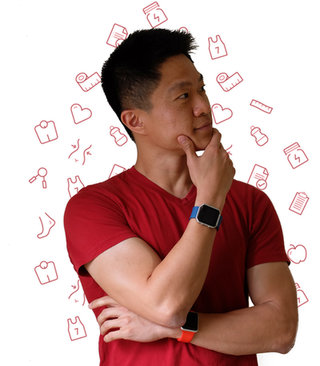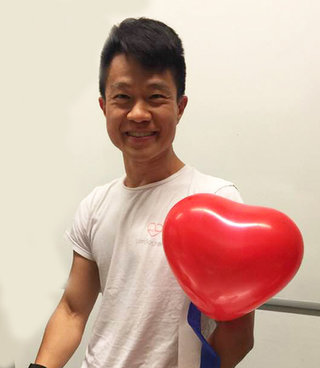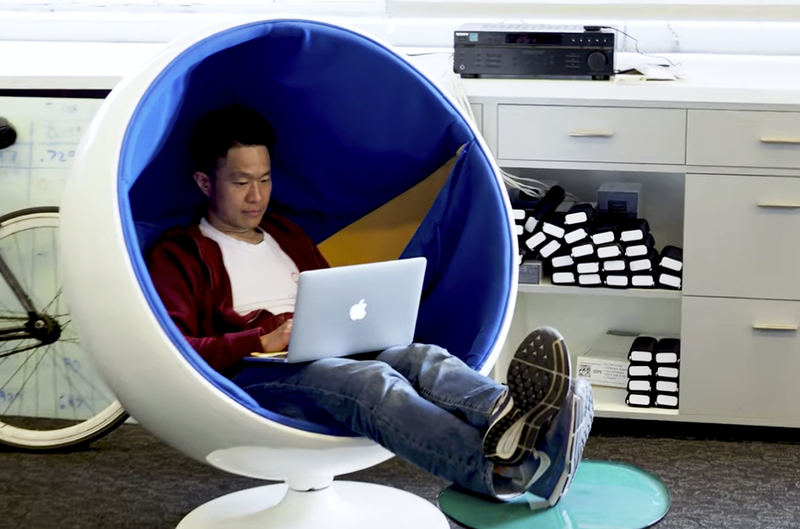
“Think of Cardiogram as an example of AI performing the tasks that doctors can’t.”
Brandon Ballinger
Co-Founder, Cardiogram

The proliferation of wearable devices like watches and fitness trackers is set to disrupt the healthcare industry. Already over 100 million people own some sort of wearable with a heart rate sensor, like an Apple Watch, Android watch, or Garmin. In the next five to ten years, wearables will be as prevalent as mobile phones and 80 percent of the population will have a wearable with a heart rate sensor in some form or another. In the future, heart rate sensors may not just be on your watch, but also on steering wheels on cars, office chairs, in earrings or pendants, or in our undergarments or in our mattresses. The increasing diversity of wearable sensors on the market will not only continue to drive that upward trend—it will also expand the realm of wearable data capture from traditional measures, such as activity level, heart rate, and sleep, to new measures, such as acceleration, altitude, glucose levels, respiration rate, temperature, and hydration. This will generate enormous amounts of sensor data that will increase the need for AI systems to analyze and surface the most relevant insights.
It's this opportunity that Cardiogram's founders love. They want to transform your wearable into a personal healthcare assistant. Using deep neural network technology and machine learning, the company's DeepHeart platform can analyze sensor data from any of these devices and give users insights via a mobile app. By using the built-in heart rate monitor from your wearable, Cardiogram can track signs of hypertension, sleep apnea, diabetes, and atrial fibrillation.
Cardiogram’s simple yet powerful concept is captured in its unforgettable company slogan, “What’s Your Heart Telling You”. By turning a wearable device into a personalized health monitor, everything from sleep patterns to fitness metrics to heart health can be continuously tracked and recorded. A wearable device for screening is an effective and inexpensive tool to determine a customer’s need for further testing, diagnosis, and treatment. The company dedicates itself to helping users confirm diagnoses and guide them to appropriate treatment through a program called Cardiogram Care.
The preventative medicine approach to quality of life using Cardiogram is a logical health care progression considering today’s evolving technology capabilities. By detecting warning signs immediately, early intervention increases successful health outcomes, reducing the number of strokes, complications, emergency room visits, and heart incidents, improving health and saving lives.
Johnson Hsieh and Brandon Ballinger founded Cardiogram together. Both have strong roots in technology and artificial intelligence. Brandon was a software engineer at Google, using applied machine learning for a variety of projects. He was a member of the HealthCare.gov rescue team and co-founder of Sift Science.
Johnson Hsieh also worked for Google, applying AI in both Android Voice Assistant and Search. A key principle driving Cardiogram is that artificial intelligence does not have to compete with people or remove medical jobs. AI performs useful tasks that doctors cannot or should not spend time on, like using large data sets and computational tools to develop deep learning algorithms.
Cardiogram exists to solve challenges and improve lives. Hsieh believes strongly in not using AI solely for the sake of AI. He thinks of his work in terms of user-first or customer-first, in contrast to mobile-first or AI-first. The question Hsieh asks is, “What is the most valuable problem we can solve for some group of people, either using mobile, or AI, or anything else?”
Two Tech Entrepreneurs Using AI to Help Others
A peek into the company culture at Cardiogram
“It’s important not to do AI for AI’s sake.
Johnson Hsieh
Co-Founder, Cardiogram


The Team
We're fortunate to have an incredible team of Product Engineers and Machine Learning Engineers. The product team focuses on the mobile app by talking to our users and using their feedback to make improvements to our app. For example, for a long time, many users have requested for the ability to allow a family member to remotely monitor their heart rate data and get notified of any heart rate spikes, as well as the ability to share their heart rate data with a doctor. We've taken these feedback and built features that help users do exactly that. Another example is Cardiogram-Fitbit integration. For years we've had users asking for Cardiogram to become compatible for Fitbit, and we've finally launched Fitbit compatibility in June 2019.
The AI team has made tremendous progress in the last couple years. We're the first organization to show that it's possible to detect atrial fibrillation using photoplethysmography (PPG) sensors from wearable like the Apple Watch, and the first to successfully run a clinical trial and publish results in a peer-reviewed medical journal, JAMA Cardiology May 2018 edition, on this topic. We're also the first organization to show that it's possible to stratify risk for sleep apnea, hypertension, and diabetes, using wearables like the Apple Watch or Fitbit, and have published our findings in the AAAI 2018 machine learning conference.
The innovation culture
I think it's incredibly important to empower people in our organization with the autonomy to drive product direction, and lead innovation, discussions, and change. My role as the co-founder and CEO is to set the high level vision and mission for the company, and create a culture where creativity can come from anyone regardless of title or years of tenure at the company, and where healthy debates are encouraged.
We try to incorporate ideas and innovative cultural values to Cardiogram from other successful tech companies, like Google, where I previously worked at for 8 years, as well as other companies I've read about like Stripe and Khan Academy, for example, on encouraging bottom-up innovation, managing chaos, and email transparency.
I've also learned a lot from the book "Principles: Life and Work" and are using its concepts to refine many processes at Cardiogram. For example, encouraging thoughtful disagreements and having radical open mindedness require that instead of trying to convince others you're right, you instead seek to understand the truth and become open to the possibility that you may be wrong yourself; these are important principles that allow our organization to have more productive brainstorming sessions where everyone tries to seek the truth instead of trying hard to push each of our individual agendas.
The idea of believability weighted decision making helps us make better decisions by looping in the right people for advice, weighing their opinions based on their track records, and triangulating ideas across multiple trusted individuals. Radical transparency is another important idea. I've tried to internalize all of these concepts and implement them at Cardiogram, hopefully inspiring our teams to be creative and collaborative, and execute at the highest level, at the same time feel rewarded from working with other talented teammates and making incredible progress and achievements together. I think it's incredibly important for startup companies like ours to have a culture that allows us to learn quickly, make better decisions, make faster progress, and have fun while doing so, and that's the culture we've been building towards.
A peek into the company culture at Cardiogram
We asked Johnson Hsieh, co-founder & CEO of Cardiogram on how he drives and motivates his engineering team. Here’s what he told us:
Cardiogram is taking a step further by using machine learning to analyze wearable heart rate data and can now stratify risk for 4 medical conditions—sleep apnea, hypertension, atrial fibrillation, diabetes.
When the risk score surpasses a certain threshold, Cardiogram's workflow called Cardiogram Care helps users get to a formal medical diagnosis, and if diagnosed, it'll refer them to the right paths of treatment. Cardiogram sends users confirmatory medical devices and get laboratory tests done to confirm their medical diagnoses. For sleep apnea, Cardiogram sends users an At-Home Sleep test; for hypertension, it'll send users a Smart Blood Pressure cuff; for atrial fibrillation, it'll send users a mobile ECG device; and for diabetes, it'll send users to a Quest Diagnostic or Lab Corp location to get an A1c test. Once the user takes the test, they'll send the sleep test back to Cardiogram's partner vendor where there's a doctor on staff to analyze the results and make a medical diagnosis. Cardiogram receives the medical report from the doctor, forward it to the users, and update the Cardiogram app to show the results and the next steps. There are similar workflows for the other 3 conditions.
"Using the Cardiogram mobile app and Cardiogram Care, we have the opportunity to help users catch medical conditions early, thereby preventing downstream medical complications, reducing emergency room visits, and helping people to get treatments earlier, or give them insights to change their lifestyles earlier, so that they can lead healthier lives," says Hsieh.
On the enterprise side, Cardiogram is working with health insurers on early detection, so that it can keep their members healthy and reduce medical costs. When Cardiogram Care helps a user stratify the risk for a medical condition and helps them confirm the diagnosis using a medical device, Cardiogram will get paid by health insurers for making the diagnosis. "Insurers are willing to pay us because by identifying undiagnosed conditions earlier, we can potentially avoid very expensive medical costs," says Hsieh. For example, atrial fibrillation is a common cause of stroke, which is not only life threatening to the patient, but could cost upwards of $50,000-100,000. By identify afib earlier, the patients could be on medication that reduces their chance of a stroke by 80 percent. Cardiogram has formally announced partnership with Oscar Health insurance and is working with other health plans providers to bring Cardiogram Care to their members.
On the consumer side, there is a premium version of the Cardiogram app that users can pay a small fee per month to access premium features such as the ‘Share with Family’ and Share with Doctor features. “We've already seen incredible user stories of how these features are changing people's lives,” says Hsieh. One user had a mild heart attack and was put on metoprolol, a beta-blocker. However, being on this medication was making him feel very tired, and he wanted to decrease drug dosage to improve his quality of life. So he used the ‘Share with Doctor’ feature to show his doctor that his resting heart rate is consistently well below 70 bpm and that he may be a potential candidate for reducing drug dosage. There are similar impactful stories, for example users using ‘Share with Family’ to monitor a loved one's heart rate after a heart surgery.
Cardiogram is bringing the power of its technology to help people seek medical care and treatment earlier rather than later so they live healthier. Retention is critical to the effectiveness of mobile health research. Cardiogram maintains user engagement with a modern app design and feel similar to popular consumer apps. Cardiogram has a user opening rate of 54 percent on day 90. This impressive retention rate enables Cardiogram to compile a large set of data. To date, over 30 billion sensor measurements have been collected.
In the future, it may be possible for heart rate wearable devices to detect sudden cardiac arrest. For that to happen, there must be enough training data available for the AI algorithms like DeepHeart to learn from. This is possible, but it requires an adequate number of users with wearable devices to have sudden cardiac arrest. Mobile platforms make it possible to gather data such as this at a much faster pace for medical research than anything available in the past. Another positive trend is more health care plans are covering wearable devices. Incentives are being offered for users to take control of their health and proactively monitor their fitness.
Cardiogram’s mission statement is to harness the capabilities of advanced technologies to reinvent preventive medicine, improve people’s health, and reduce medical spend by empowering people with more insights and tools to manage their own health. Clinical studies prove that Cardiogram’s DeepHeart artificial intelligence used in wearable devices detects atrial fibrillation, hypertension, sleep apnea, and diabetes. In the future, it may be possible to detect hundreds of medical conditions, possibly including acute and urgent conditions, as well as general wellness insights, and have the AI system recommend to users specific behaviors to improve your health and also talk to users in a way that is personalized and motivating. As this happens, Cardiogram continues adding even more features to the Cardiogram app to give users more advanced and continuous health insights, and tools to engage family members and other caretakers to help them stay healthy throughout their health journey. By putting patients and users at the center of healthcare, Cardiogram can help people become healthier, by reducing friction to receiving health insights and interpreting their own health status, and reducing friction to completing diagnostic tests and going to see a doctor. Ultimately, Cardiogram has the potential to prevent medical complications, reduce emergency room visits, reduce medical spend, and maximize people’s health and longevity at a large scale through their mobile app platform.
“The ultimate goal is to give users the tools to become empowered to take more ownership of their own health, give them actionable insights and tools to take action, and help them make behavior changes that'll help maintain and improve their health,” says Hsieh and what he is building at Cardiogram could be everyone’s health companion very soon.
Go-to-market strategy
What Is the Future for Cardiogram?
Risk Stratification
Johnson Hsieh
“What is the most valuable problem we can solve for some group of people?”
Co-Founder, Cardiogram

DeepHeart is Cardiogram’s deep learning neural network that accurately predicts a user’s cardiac risk. DeepHeart forms the nucleus of Cardiogram’s future preventative health projects. Rigorous clinical studies demonstrate DeepHeart’s ability to predict cardiovascular risk.
AI’s challenge is that it can be difficult to collect enough training data that the algorithm needs in order to learn. Speeding up the collection of training data will be important to advance the capabilities of medical wearables.
Cardiogram leverages mobile platforms to collect data from users to train DeepHeart. In order to get adequate data to build its medical AI neural network, Cardiogram created its own data set. Initially, 30,000 participants were recruited in an online study in conjunction with the University of California, San Francisco eHeart study. Currently, more than 100,000 volunteers have participated.
DeepHeart: Meet Cardiogram’s Deep Neural Network
What’s Your
Heart Telling You?
Cardiogram
Cardiogram wants to be the Microsoft of the Wearable Devices world. In the 90s when there were many PC hardware manufacturers Microsoft built a unifying software platform that worked with all of those PCs. Cardiogram's goal is similar. "We're aiming to build a unifying software platform to analyze sensor data from wearable devices," says the ambitious Johnson Hsieh, co-founder and CEO.
By Connie Yerbic





